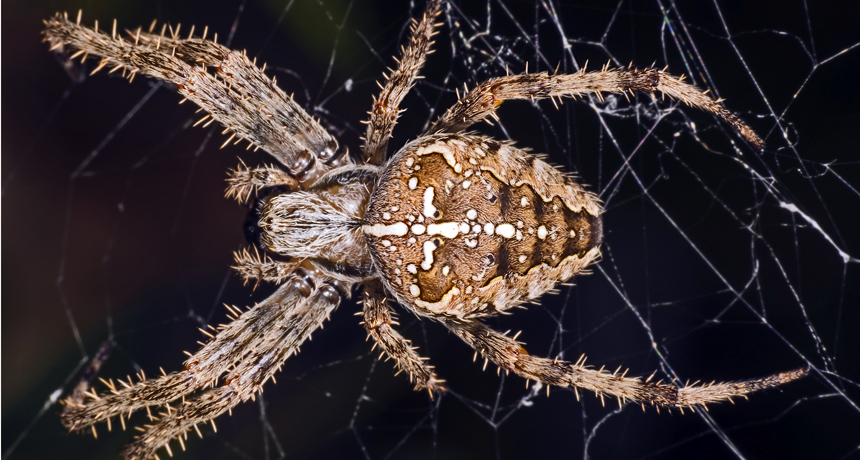Quieter vibes for city spiders
Webs built on artificial structures may vibrate less than in nature

European garden spiders, like the one here, spin a new web every morning. It then eats the web at night. Scientists found that the material on which a spider anchors its web can affect the predator's ability to sense the arrival of prey.
Didier Descouens/Wikimedia Commons
A spider can sense when a delicious bug gets caught in its web. It feels vibrations on the silky threads as its prey fights to escape. That’s when the predator moves in for the kill. This spidey-sense may work better in some places than others, a new study finds. Walls, metal poles or other human-made structures can dampen a web’s natural vibrations. And that could make it harder for a spider to know that dinner is calling.
In lab experiments, spiders with less-mobile webs were slower to detect prey than spiders in springy ones. The scientists describe their findings in the April issue of Animal Behaviour.
Scientists have long sought to understand how human activities influence animal behavior. They’ve probed how city noise affects bird songs and how animals respond to loud machines near gas wells. However, Chung-Huey Wu thinks his team’s new study is the first to look at how human environments affect spiders. He is a biologist at National Taiwan University in Taipei City
Wu collected his data on spiders during a year he spent at the University of California, Berkeley, working with biologist Damian Elias. They studied the European garden spider (Araneus diadematus). Every morning, this spider spins a new web. All day long it sits in the middle of that web, waiting for prey. When night comes, the spider eats the web. It spins another web the next morning.
Wu found 50 spiders around town. He looked at what their webs were attached to. The spiders used both natural materials and ones made by people. The webs were attached to parking signs, bookstores, leaves, twigs and other structures.
Wu also measured vibrations in the materials the spiders were using as attachment spots. “What it looked like was a man with a tripod, wearing headphones, doing serious things, staring at a tree,” he told Science News.
City traffic noise appeared to have no effect on a spider’s awareness of its prey, Wu and Elias concluded. But where a spider anchored its web might. Webs attached to human-made materials like plastic, steel and concrete didn’t vibrate as much as did those anchored to natural materials like twigs and plants, they found.
Armed with this finding, the scientists headed into the lab for more tests with the garden spider. They wanted to see if there was an effect on the spider’s ability to hunt. They built frames from different materials and let the spiders spin webs inside them. The scientists also used an audio speaker to send out vibrations that moved a rod attached to each web. Those sound waves jostled the web slightly. This imitated the arrival of insect prey.
For their experiments, the scientists shook the webs’ frames at low, medium and high vibrations. This simulated quiet, breezy and extreme environments. (A construction site, with lots of noise and shaking, would be considered an extreme environment for a spider web.) As each web shook, the scientists used the speakers to mimic the arrival of a bug on the web.
They wanted to see how fast spiders responded to the prey-like motion. Spiders in the medium, or breezy, environment responded most quickly. Wu suspects that a breezier condition kept the spiders more alert.
Despite the differences, the changes in vibration may not cause problems for spiders, Wu says. The reason: Where flies and other prey are plentiful, spiders may not have any problem finding food.
The daily building of a web takes a lot of energy on the spider’s part, notes Chad Johnson. He’s a biologist at Arizona State University in Tempe. He studies black widow spiders. His data show that in cities these poisonous spiders tend to build smaller webs than when they live in the desert.
Johnson says the new study on city spiders may help explain those smaller webs. It would suggest that “city spiders cannot afford to spend a lot on a web that is going to be lousy at transmitting vibrations.”
Power Words
behavior The way a person or animal acts towards others, or conducts itself.
biology The study of living things. The scientists who study them are known as biologists.
predator (adjective: predatory) A creature that preys on other animals for most or all of its food.
prey Animal species eaten by others.
tripod A three-legged stand for supporting a camera or other apparatus.
vibrate To rhythmically shake or to move continuously and rapidly back and forth.







